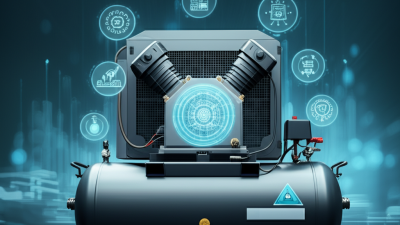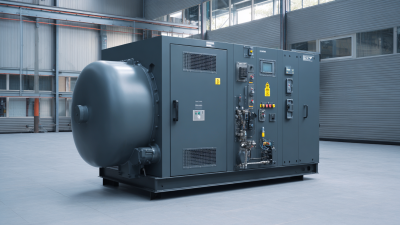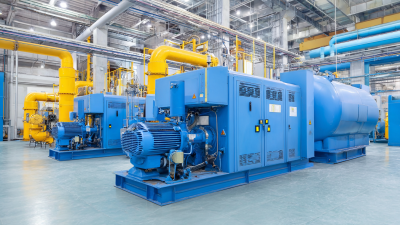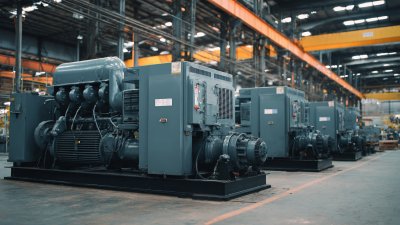1-800-868-2450
My Account | Cart | Checkout
The Future of Industrial Air Compressor Technology Innovations to Watch
As industries continue to evolve, the demand for efficient and reliable industrial air compressors has never been more critical. According to a report by Research and Markets, the global industrial air compressor market is expected to reach $37.2 billion by 2028, growing at a CAGR of 4.2% from 2021. This surge is largely driven by the increasing need for energy-efficient solutions that can reduce operational costs and environmental impact. Innovations in technology, such as variable speed drive compressors and IoT integration, are expected to transform the landscape of industrial air compressor systems, enhancing performance and sustainability. Moreover, advancements in materials and design are paving the way for more compact and quieter machines, catering to the evolving needs of various sectors. As we look to the future, staying informed about these developments will be crucial for businesses looking to optimize their operations and maintain a competitive edge in the market.

Emerging Trends in Energy Efficiency for Air Compressor Systems
In recent years, the industrial sector has witnessed a significant shift towards energy efficiency in air compressor systems, driven by both economic and environmental considerations. According to the U.S. Department of Energy, compressed air systems account for approximately 10% of the total electricity usage in industrial settings. As industries strive to reduce operational costs and carbon footprints, innovations in energy-efficient compressor technologies are gaining traction.
One notable trend is the adoption of variable speed drives (VSD), which allow compressors to adjust their speed according to demand. A report by the International Institute for Compressors indicates that VSD-equipped systems can achieve energy savings of up to 35% compared to traditional fixed-speed models. Additionally, advanced control systems are being implemented, enabling real-time monitoring and optimization of compressed air usage, further enhancing efficiency. With the rise of Industry 4.0, data analytics and the Internet of Things (IoT) are expected to play a crucial role, providing insights that can lead to additional savings and improved performance in air compressor systems.
The Future of Industrial Air Compressor Technology: Energy Efficiency Trends
The Role of IoT in Transforming Industrial Air Compressors
The integration of IoT technology is revolutionizing industrial air compressor systems, enabling unprecedented levels of efficiency and data-driven decision-making. As industries focus on enhancing production capabilities while adhering to stricter regulations and sustainability goals, the role of IoT in air compressor technology cannot be overstated. Real-time monitoring of compressor performance allows for predictive maintenance, reducing downtime and operational costs significantly. By implementing IoT solutions, facilities can ensure their air compressors operate at peak efficiency, contributing to overall energy savings and reduced environmental impact.
Recent advancements, such as the introduction of AI-driven platforms supported by IoT connectivity, illustrate the potential for significant improvements in industrial operations. These platforms can analyze vast amounts of data generated by air compressors, optimizing their performance in high-energy-consuming environments. As the market for compressed air treatment equipment is projected to exceed $9 billion in the coming years, the push towards smart, connected devices will only grow stronger. Such innovations not only enhance operational effectiveness but also align industrial practices with modern energy efficiency standards, paving the way for a more sustainable industrial future.
Advancements in Materials and Their Impact on Compressor Lifespan
The advancements in materials used for industrial air compressors are crucial for enhancing their operational lifespan and efficiency. Innovations such as high-strength alloys and composite materials have emerged, allowing manufacturers to produce lighter and more durable components. These materials not only withstand the high pressures and temperatures associated with compressor operation but also resist corrosion and wear, resulting in less frequent maintenance and reduced downtime.
Moreover, the use of advanced coatings and surface treatments has further improved the longevity of compressor parts. These coatings provide an additional protective layer, minimizing the impact of environmental factors and extending the life of key components. As a result, the adoption of these new materials is expected to lower the total cost of ownership for businesses relying on air compressors, while also contributing to sustainability efforts through reduced resource consumption and waste. The future of industrial air compressor technology lies in these material breakthroughs, paving the way for more efficient and resilient operations.
Smart Technologies: Enhancing Performance Through Automation
The industrial air compressor landscape is evolving rapidly, driven by technological advancements that enhance efficiency and performance. One significant trend is the integration of smart technologies, which leverage automation to optimize compressor operations. These innovations enable real-time monitoring and control, reducing downtime and improving energy efficiency. By utilizing predictive maintenance, facilities can now anticipate issues before they become critical, thereby extending the lifespan of their equipment.
Tips: To unlock the full potential of smart air compressor technology, consider investing in systems that offer remote access and analytics features. This will not only enhance operational visibility but also facilitate better decision-making regarding maintenance and energy usage.
Another exciting development in the realm of industrial air compressors is the use of IoT (Internet of Things) devices. These interconnected systems allow for seamless data exchange and operational insights, which can lead to better resource allocation and minimized energy costs. By harnessing the power of IoT, industries can fine-tune their air compressor settings to match real-time demand, ensuring optimal performance at all times.
Tips: When implementing IoT solutions, focus on selecting compatible devices that integrate well with your existing infrastructure. This approach will make it easier to create a cohesive system that maximizes efficiency and minimizes disruptions.
Sustainability Practices Shaping the Future of Air Compressor Design
As industries strive for sustainability, the design of air compressors is evolving to align with eco-friendly practices. This shift emphasizes not just efficiency but also the use of sustainable materials and energy sources. Innovations such as variable speed drives and advanced control systems enable compressors to operate at optimal levels, significantly reducing energy consumption and emissions. These technologies also facilitate the integration of renewable energy sources, such as solar or wind power, into air compressor systems, making them more environmentally friendly.
**Tip:** When evaluating air compressor technology, consider models that offer energy recovery systems. These systems capture waste energy and repurpose it for other uses, enhancing overall efficiency.
Another key aspect of sustainable air compressor design is the reduction of noise pollution and the promotion of quieter operations. Manufacturers are incorporating advanced acoustic engineering techniques to minimize noise levels, which not only improves the working environment but also complies with stricter regulations in many regions. Moreover, the adoption of smart technology allows for predictive maintenance, which ensures that compressors run efficiently and reduces the need for frequent replacements, thereby decreasing overall waste.
**Tip:** Look for air compressors with built-in IoT capabilities. These features allow for real-time monitoring and diagnostics, helping maintain performance and extending the lifespan of the equipment.
Copyright © 2025
I&M Industrials Inc.
10 Akron Drive
Greenville SC 29605
Phone: 864-277-2450
GSA Number – GS07F0379Y


